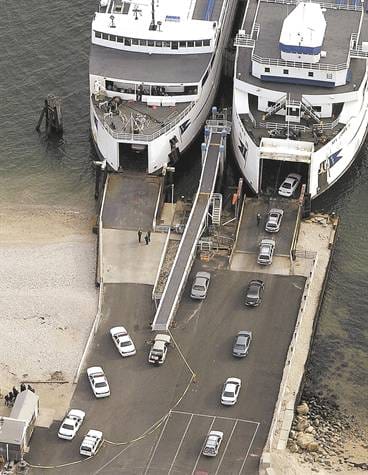Family Of Ferry Accident Victim Settles For $3.2M
by Karen Florin
The Day
February 2, 2008

.
In this Nov. 19, 2002 file photo, police cars block access to Cross Sound Ferry’s Susan Anne, left, following an accident in which a tractor-trailer rolled off the boat, killing its driver, who was still in the cab. (Sean D. Elliot)
The survivors of a truck driver who died when his tractor-trailer rolled off the stern of a Cross Sound ferry five years ago have received a settlement of more than $3.2 million from the ferry company and the Workers Compensation Commission.
The ferry company, while not admitting fault, has added safety equipment as a result of the accident.
Michael Zuber, 53, a father of three from Stratford, was hauling a rock crusher from Branford to Long Island when he boarded the Susan Anne in New London on Nov. 20, 2002. The ferry was less than a mile away from the dock at Orient Point when the truck rolled off the back of the boat and sank into the turbulent waters of Plum Gut. Zuber was found unconscious in an oil slick and was pronounced dead at a local hospital.
Zuber’s wife of 20 years sued the ferry company for negligence. One of her primary complaints was that the ferry crew had not secured the truck’s back wheels with blocking devices known as chocks. Also, the crew allowed Zuber to stay in the truck’s cab during the trip despite the company’s policy that passengers leave their vehicles while the ferry is under way. The ferry crews have said they often allowed truck drivers to remain in their cabs to catch up on their rest.
“I’m satisfied with how the case was resolved,” Gail Zuber said this week. “I’m hoping they will take more safety precautions. Chock all the trucks, even tie them down with chains if possible. Any kind of measures that make it safer.”
Zuber said she would not want another family to suffer this kind of loss. She and her three children were “like zombies” for a long time, she said, but everyone is now doing well and adjusting, “Thank God.”
The ferry company’s insurer handled the lawsuit, deciding in October 2007 to settle the case for $2.25 million. A Probate Court approved the agreement. Zuber’s widow and his estate also received around $1 million from the Workers Compensation Commission, according to the Zubers’ attorney, William M. Bloss of the Bridgeport law firm Koskoff, Koskoff & Bieder.
Multiple witnesses had testified at depositions that the truck’s wheels were not chocked, and the ferry company readily admitted to that, Bloss said.
“They took the position that Coast Guard regulations relating to chocking were ambiguous and legally they didn’t need to chock the truck,” he said.
Bloss said the truck’s brakes had failed when pinhole leaks caused the air to bleed out. The truck had been manufactured in Europe, he said. Had it been made in America, the brakes would have locked when the air pressure bled out, he said.
“It was a tragic set of circumstances, but clearly the tragedy does not occur if a single chock was used,” Bloss said. Also, he said, had the crew enforced the policy of not allowing passengers to stay in their vehicles, Zuber would have been safe in the ferry cabin.
He said a crewmember testified that he heard the brakes set when the truck was brought onto the ferry and that a deckhand who was standing near the truck when it started to roll did not hear the truck start up or see any brake lights.
“There is absolutely no evidence the truck was engaged when it started to roll,” Bloss said.
Adam Wronowski, vice president of Cross Sound Ferry, said the Coast Guard did not cite or charge any crewmembers following a months-long investigation, and that the company had hired its own engineers and other experts to ensure it is taking every safety precaution.
“We spent a lot of time on this, and believe me, we’re making sure we’re doing everything possible to make sure this never happens again,” he said.
Wronowski said the ferry crews had previously chocked the wheels of all vehicles at the end or edge of the boats. Zuber’s truck was in the middle of the boat, but at the end of line of vehicles, Wronowski said. Now, he said, “We chock everything at the end of the line.”
“The bottom line is, there’s a loss of life here, and regardless of how or why, that’s a tragedy. We’ve always had a strong opinion as to why and how the truck went off the boat. Part of that very strong opinion was that it was through no fault of ours and the crew.”
Wronowski declined to go into detail “out of respect for the (Zuber) family.”
The bulk of the tractor-trailer remains at the bottom of the Sound. It sank in about 100 feet of water in a treacherous area that made it difficult to salvage.

